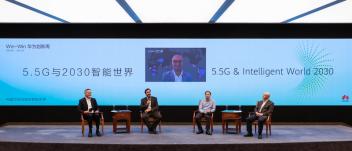5.5G, an enhanced version of 5G, is expected to be put into large-scale commercial use by 2025 to further digitalize the economy and society, and speed up green and intelligent transformations, according to an International Telecommunication Union (ITU) expert.
Walid Mathlouthi, Head of the ITU's Future Network & Spectrum Management Division disclosed this during the 5.5G and Intelligent World 2030 media roundtable at HuaweiWin-Win Innovation Week held this week. He said that spectrum will be crucial for future ICT development, especially in mobile communications and 5G to 5.5G evolution.
"It is important for unified standards to be adopted worldwide. Relevant spectrum guidelines will be released at the WRC at the end of 2023." He predicted that 5.5G will be put into commercial use in 2025.
Wang Qi, Chief Marketing Officer of Huawei 5.5G Wireless Network, agreed with this prediction and said we need wireless technologies that are more capable than 5G within the next 5 to 10 years. This emerging technology will play a vital role in the growth of the digital economy. He added.
Further exploration of these technologies will be critical in driving innovation in a wider range of application scenarios. "5G will continuously evolve toward 5.5G with enhancements such as 10times faster connectivity and stronger IoT and sensing capabilities," He concluded.
Jose Ahimsa Campos-Arceiz, Professor and Principal Researcher at the University of the Chinese Academy of Sciences, stated that "Using ICT technologies such as the Internet, big data, IoT, remote sensing, radar, and drones, we will be able to build a comprehensive monitoring system supported by 'space-air-ground' integrated monitoring networks. This system helps us monitor key locations around the clock including road entrances and exits, wildlife habitats, and road nodes in protected areas".
Lin Yanqing, a senior policy expert on government affairs at Huawei, also explained how green development was being taken into consideration during 5.5G development. The increasing use of ICT technologies in industrial settings will allow 5.5G to contribute more to energy conservation and emissions reduction efforts. According to a report released by Global Electronic Sustainability Association (GeSI), the ICT industry will only account for 1.97% of global carbon emissions by 2030, but the use of advanced ICT technologies in other industries can reduce their carbon emissions by 20%, amounting to a total emissions reduction 10 times greater than what the ICT industry will produce itself.
Source: Press Release
